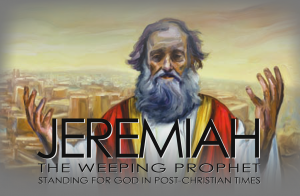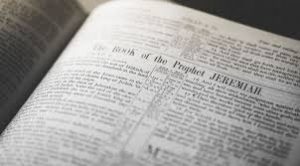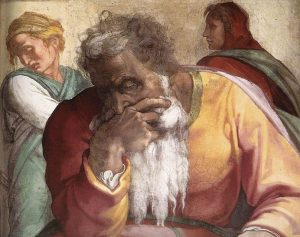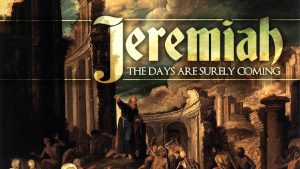Wisdom-Trek / Creating a Legacy
Welcome to Day 946 of our Wisdom-Trek, and thank you for joining me.
I am Guthrie Chamberlain, Your Guide to Wisdom
Jeremiah: Double Vision? – Wisdom Wednesday

Thank you for joining us for our five days per week wisdom and legacy building podcast. We are broadcasting from our studio at The Big House in Marietta, Ohio. Today is Day 946 of our trek, and it is Wisdom Wednesday. Creating a Biblical worldview is important to have a proper perspective on today’s current events.
To establish a Biblical Worldview, you also need to have a proper understanding of God’s word. Especially in our western cultures, we do not fully understand the Scriptures from the mindset and culture of the authors. In order to help us all have a better understanding of some of the more obscure passages in God’s word, we are investing Wisdom Wednesday reviewing a series of essays from one of today’s most prominent Hebrew Scholars Dr. Micheal S. Heiser. He has compiled these essays into a book titled I Dare You Not to Bore Me with the Bible.
Should we be concerned when there are differences in the ancient text from which our modern Bibles are translated? Today’s essay will explore one such instance and how we should consider the outcome.
Jeremiah: Double Vision?

If we look beyond the details of Jeremiah’s anguish and apparently fruitless ministry, we can spot a dual emphasis in the book that bears his name: judgment and repentance. Emphasis is not the only double issue. Two full versions of the book have survived from antiquity—and they diverge in many ways.
· The “Jeremiah Problem”
The book of Jeremiah has come to us in two versions—a Hebrew version, the Masoretic Text, and a Greek version, the Septuagint (the ancient Greek translation of the Old Testament). Our modern English Bibles follow the arrangement and content of the Masoretic Text. The Septuagint version (or lxx) was translated from a Hebrew text of the book that differed in many ways from the Masoretic Text. Because of this, the Greek version is roughly one-eighth shorter than the Masoretic Text, and after Jeremiah [25:13], the order of the chapters differs dramatically.
Despite attempts to solve the “Jeremiah problem,” the textual history of both versions remains unresolved. We still don’t know which Hebrew text is older—the one we have today from the Masoretic Text or the one used by the scribes who created the Septuagint.
The fragmentary scrolls of the book found among the Dead Sea Scrolls usually follow the order and content of the Masoretic Text, but some of the material matches the Hebrew manuscript that was translated into the Septuagint. Consequently, the Dead Sea Scrolls cannot offer a definitive answer regarding which version of the book more closely aligns with the time of the prophet.
We also find mixed results when examining the history of these versions. The Jewish community favored the Masoretic Text version, but this is only apparent from around 100 AD onward, after the time of Jesus and the apostles. New Testament writers favored the Septuagint when quoting the Old Testament.
Studies reveal that when the Old Testament is quoted in the New Testament, the wording found in the Greek New Testament, the Masoretic Text, and the Septuagint differs in some way 80 percent of the time. Word-for-word quotations of the Masoretic Text are not common, amounting to less than five percent. Even when factoring in nearly identical quotations of Masoretic Text, it is clear that the New Testament writers only appear to have used Masoretic Text 20 percent of the time. The New Testament writers most often quoted from the Septuagint, but this doesn’t mean they endorsed or preferred it, since they used both versions. They were writing in Greek, and so using a Greek translation would have been natural.

· A Practical Response
So what can we conclude about the book of Jeremiah? Well, we cannot conclude that the Septuagint is to be preferred over Masoretic Text, as though it were more sacred or “original.” If that were the case, it would be shocking to see the New Testament writers quote the Masoretic Text. The reverse is true as well. Neither version deserves a higher status.
Perhaps the real lesson is that the New Testament writers, working through divine inspiration, weren’t concerned about the issue. There isn’t a single instance that indicates concern over which manuscript was being used or quoted.
This lack of concern is reflected in the ministry of Paul, who preached in synagogues all over the Mediterranean. Each synagogue had its own biblical text and its own scrolls, sometimes Septuagint and sometimes Masoretic Text and Paul used whatever was at his disposal. The same is true in his own letters. He trusted God s provision that he was reading and preaching the very word of God. So should we.
We can rest in the truth that God’s Word in its original writings was given by divine inspiration as we are told in 2 Timothy 3:16, “All Scripture is inspired by God and is useful to teach us what is true and to make us realize what is wrong in our lives. It corrects us when we are wrong and teaches us to do what is right.”

That will conclude our essay for this week. Next Wisdom Wednesday, we will continue with the Old Testament as we look at Dr. Heiser’s next essay titled “Where Is the Ark of the Covenant?” I believe you will find this another interesting topic to consider as we build our Biblical worldview.
Tomorrow we will continue with our 3-minute humor nugget that will provide you with a bit of cheer and help you lighten up and live a rich and satisfying life. So encourage your friends and family to join us and then come along with us tomorrow for another day of our Wisdom-Trek, Creating a Legacy.

If you would like to listen to any of our past 945 treks or read the Wisdom Journal, they are available at Wisdom-Trek.com. I encourage you to subscribe to Apple Podcast or Google Podcast so that each day’s trek will be downloaded automatically.
Thank you so much for allowing me to be your guide, mentor, and most of all your friend as I serve you through the Wisdom-Trek podcast and journal.
As we take this trek together, let us always:
- Live Abundantly (Fully)
- Love Unconditionally
- Listen Intentionally
- Learn Continuously
- Lend to others Generously
- Lead with Integrity
- Leave a Living Legacy Each Day
I am Guthrie Chamberlain reminding you to Keep Moving Forward, Enjoy Your Journey, and Create a Great Day Everyday! See you tomorrow!